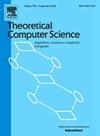Oracle separations for non-adaptive collapse-free quantum computing
IF 0.9
4区 计算机科学
Q3 COMPUTER SCIENCE, THEORY & METHODS
引用次数: 0
Abstract
Aaronson et al. (2016) introduced the quantum complexity class (non-adaptive Collapse-free Quantum Polynomial time), also known as (Product Dynamical Quantum Polynomial time), aiming to define a class larger than (Bounded-error Quantum Polynomial time), but not large enough to include -complete problems. Aaronson et al. showed that (Statistical Zero Knowledge) is contained in and that there is an oracle A for which . We prove that: there is an oracle A for which , where (Unambiguous Polynomial time) is an important subclass of ; relative to an oracle A chosen uniformly at random, it holds with probability 1. Our results are a strengthening of the results by Bennett et al. (1997), Fortnow and Rogers (1999), Tamon and Yamakami (2001), and Aaronson et al. (2016).
求助全文
约1分钟内获得全文
求助全文
来源期刊

Theoretical Computer Science
工程技术-计算机:理论方法
CiteScore
2.60
自引率
18.20%
发文量
471
审稿时长
12.6 months
期刊介绍:
Theoretical Computer Science is mathematical and abstract in spirit, but it derives its motivation from practical and everyday computation. Its aim is to understand the nature of computation and, as a consequence of this understanding, provide more efficient methodologies. All papers introducing or studying mathematical, logic and formal concepts and methods are welcome, provided that their motivation is clearly drawn from the field of computing.
 求助内容:
求助内容: 应助结果提醒方式:
应助结果提醒方式:


